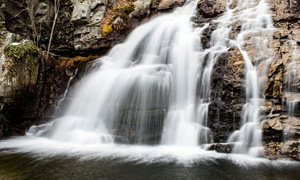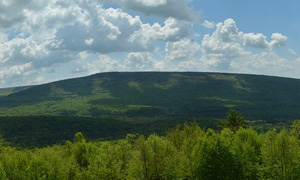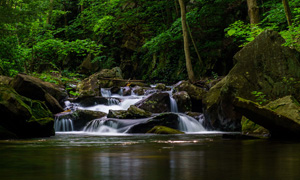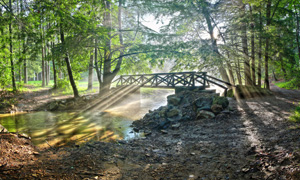The following is an adaptation of a speech given by Marci Mowery as part of an acceptance speech when being named Distinguished Pennsylvania Geographer in 2017.
I titled my presentation Ramblings from a Reticent Geographer for a reason—the reason being that I have confession to make. At the point at which I was contacted and asked if I would accept the award I did not refer myself as a geographer. This is despite the fact that I have a Masters degree in Geoenvironmental studies from the GEOGRAPHY Earth Science Department at Shippensburg University.
Hmmmm. I pondered this for days, weeks actually, as I mulled over what I wanted to say tonight. I use a lot of titles and roles to describe myself—conservationist, environmentalist, educator—to name a few. I’ve spent my career in conservation in the non-profit community—which makes me a conservationist, right?
Then it hit me. And it was obvious. Geography was my tool, my vehicle, for the work that I do.
For me, geography has always been about developing a sense of place and about connecting people to that place to better understand the impact of their decisions. And when I reflected upon it, I realize that my sense of place began at the ripe age of 7.
It’s 1972 and young Marci is standing at the door watching it rain. Now I was an outdoor child, so a little rain didn’t bother me. In fact, I liked to make boats out of natural materials and float them in the gutter during storms, imagining them making their way down to the river. I grew up in the town of Columbia, in Lancaster County, and the river to which I refer is the Susquehanna River.
But this rain was unlike any rain I had ever experienced, lasting not just hours, but days. The curb where I liked to play was slowly being consumed by a rising wall of water. My street became a stream, and there seemed to be no end in sight.
Across the river from me lived my Grandfather, in a community known locally as Murphy’s Hollow. I knew he lived closer to the river than I did, even though I could see the river from my neighborhood. Up river lived my cousins.
I could hear my mom on the phone, monitoring their situation. I read the newspaper with my mom, clipping out articles that showed people stranded by rising water.
You see, this was Hurricane Agnes, one of the most devastating storms to ever hit Pennsylvania.
When the rain subsided, we finally made our way outdoors to witness the devastation of water. I remember vividly to this day, the high water marks on houses, the piles of ruined goods along the curb, and the log flume at Hershey park that reminded more of a game of pickup sticks than an amusement park ride.
And I remember feeling frustrated that at 7 I could not help the many people in need.
In Pennsylvania, most folks are either shore people or mountain people when it comes to summer vacation. My family was mountain people, traveling to Cameron County each summer to a hunting camp my grandfather had helped to find in the 1930s. The camp resided in an old lumber office, for as you know, in the late 1800s timbering consumed most of the forest in Pennsylvania and these camps were quite common.
In front of the camp ran the Bennetts Branch to the Sinnemahoning Creek. As a child, I use to think that it was cool that the creek supported nothing that could harm me—no insects, fish, snakes, or any wildlife. But I didn’t remain naive—I soon understood that the creek was a product of abandoned mine drainage, as the area had been actively mined for coal for years. This was my second memory of learning about watersheds and interconnections of landscapes.
For 52 years I have visited the camp, generally around the same of time year. This afforded me the opportunity to witness the recovery of the stream and the surrounding environments, thus teaching another lesson, that of nature’s resilience. It also demonstrated to me that there were things I COULD do, even as a child, and later an adult, to conserve our natural world.
I can drive the route to the camp with my eyes closed, and returning there always feels like going home. I am a river rat—not only by passion for my life along the Susquehanna, but my school mascot was a river rat!
Yet I never wanted to be confined to one place, and when I learned how to read a map in 8th grade, I thought I was given the best prize ever. And it’s been a lover affair ever since.
Maps opened the door to the world for me, by bestowing upon me the ability to travel anywhere. And indeed I have. By the time I was 40, I had traveled to all 50 states. I’ve been to 5 of the 7 continents. I’ve been to one of the most remote island—Easter Island and the most populated country—China.
When I travel I travel not as a tourist, but as a person filled with curiosity and wonder, a person eager to understand the culture, the relationships, the natural world, and because I’m a foodie, the cuisine. My travels shaped me into the person I am today by developing my understanding of inter-relationships, of people, and of environments.
Throughout my career I have used maps to help create a sense of place for people—either through tourism initiatives, community development, land use planning, environmental education, or for fun. I believe that we cannot protect our natural assets and our communities if we don’t have a sense of place or connection. In my current position as President of the Pennsylvania Parks and Forests Foundation I know that if people are not excited about our state parks and forests, these assets will not be here for future generations.
45 years after I stood witness to the impacts of hurricane Agnes, we all stood witness to a summer of natural disasters—from floods, to hurricanes to wildfires. The work that we do now is more important than ever if we are to turn the tide on climate change, disconnection from one another, and disconnection to place. I am concerned that we’ve become reliant on our mobile devices and google maps to find our way, tossing the maps aside for technology. This focus on getting from point a to point b, removes the opportunity to wonder, to develop a sense of place, and to connect to oneself. The journey is as important as the destination, and having the ability to view the bigger picture is both metaphorical and literal.
As I close, I leave with three challenges:
- Be a mentor and find a mentor.
- Maintain your sense of curiosity.
- Don’t lose sight of the journey.
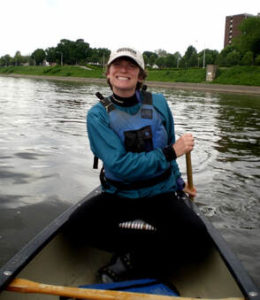
Since 2002, Marci Mowery has been the President of Pennsylvania Parks and Forests Foundation. She takes PPFF’s place as “the official nonprofit voice for Pennsylvania’s state parks and forests” very seriously, devoting endless hours (sleepless and otherwise) in pursuit of the protection of these public lands.
This blog post was originally a part of the EarthDayPA50.org website, created to celebrate the 50th anniversary of Earth Day in 2020. The website has since been retired but the sentiment is still very valid!

